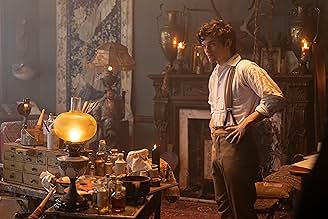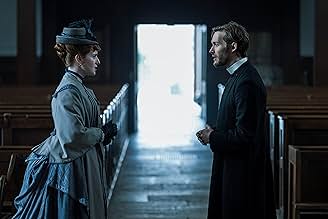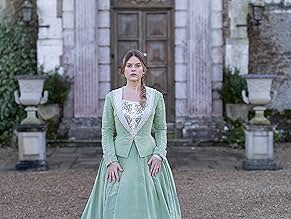25 Jahre nach den Ereignissen der letzten Sendung wird diese Familie weiterhin von Skandalen heimgesucht.25 Jahre nach den Ereignissen der letzten Sendung wird diese Familie weiterhin von Skandalen heimgesucht.25 Jahre nach den Ereignissen der letzten Sendung wird diese Familie weiterhin von Skandalen heimgesucht.
Folgen durchsuchen
Empfohlene Bewertungen
I'm a (very) latecomer to period dramas. "Downton" had long since finished before I began to tackle the 50+ episodes and what a treat that turned out to be. It would be asking a lot for any series to be its equal or even come close but one that really impressed was "The Gilded Age".
I have not seen the original "Belgravia" for the simple reason that I had never heard of it but will find it to watch.
This latest "Next Chapter" seems to be taking a lot of flak from what appear to be seasoned period drama viewers so who am I to argue?........but I will. I thoroughly enjoyed it and the final two episodes were extremely moving.
I found all of the characters to be interesting in their own way and, of course, anything with a music score by John Lunn is always worth watching.
I have not seen the original "Belgravia" for the simple reason that I had never heard of it but will find it to watch.
This latest "Next Chapter" seems to be taking a lot of flak from what appear to be seasoned period drama viewers so who am I to argue?........but I will. I thoroughly enjoyed it and the final two episodes were extremely moving.
I found all of the characters to be interesting in their own way and, of course, anything with a music score by John Lunn is always worth watching.
The Next Chapter was quite disappointing. I disliked the main character, Lord Trenchant played by Benjamin Wainwright from the moment on screen. He is sullen and has a face that shows it (think Kristen Stewart, Anna Kendrick) in every scene. I realize his character is complicated and miserable but even when proposing to his love, he looks like he ate a lemon. Just not a likeable. The new wife, Clara, played by Harriet Slater, is portrayed like a 13 year-old teenager who is smitten and Pollyanna-ish. I blame the poor writing not the actor. I wonder how such a great first series could turn into a common soap opera in the second? Made it through the first excruciating 52 minute episode and decided I couldn't continue with the series.
Ignore the low scores. I thoroughly enjoyed this. The story had many elements to it and kept my attention and me entertained throughout. If there was one negative it would be the character Frederick Trenchard. I felt the actor playing him had only one expression on his face. I feel I need to see him in something else to see if he acts any different. A comedy role perhaps because to watch him on screen in this was pretty depressing. Apart from that all of the other characters were good but one really stood out for me. The actress Hannah Onslow. Her facial expressions in every scene were captivating. She doesn't have to deliver a line of script, she just expresses herself so well with her facial expressions and body movements and often had me giggling. Well worth a watch and even a binge.
After thoroughly enjoying the original series of 'Belgravia' (a solid 8/10 miniseries, arguably 9/10), I was hopeful that most of the negative reviews of "Belgravia: The Next Chapter" would be wrong, or at least a bit exaggerated. Alas, the negative reviews are more right than wrong, and this second season is yet another example of a great show taking a massive step down from a successful first season.
It was always going to be a tough task to match the clever, rewarding, and intelligent writing of the first season, but "The Next Chapter" falls short of even the above average level of writing of well-produced shows of the modern era of entertainment. The main plot line and the character arcs of the two leads is just not very interesting, especially from about the 3rd or 4th episode on. While season one seemed too short and had you begging for more at six episodes, this second season tests your patience at eight episodes in which little seems to happen half the time. You know a writer is completely clueless when they start portraying the 1871 Paris Commune in a positive light (the best era in Paris's history, the Belle Epoque, only happened thanks to the failing of said evil Commune, not to mention that the same ideology that the Commune spouted would go on to kill 50,000,000 to 100,000,000 more people than fascism in the 20th century). The side plots are eye-rollingly predictable at best. So how does it even earn a review this high? Mainly because of the great production, excellent cinematography, and wonderful acting, especially by Harriet Slater. While other positive reviews here credit the 'victim' plot line, the reality is that the focus on victims has created a culture in which every struggling person pretends to be a victim in every way possible, causing their mental state to deteriorate. Similarly, our main male lead sulks, acts petulant, and behaves like a prick and uses his so-called 'victim' status as an excuse. Overall, this is a very skippable season of television, although not a total disaster.
It was always going to be a tough task to match the clever, rewarding, and intelligent writing of the first season, but "The Next Chapter" falls short of even the above average level of writing of well-produced shows of the modern era of entertainment. The main plot line and the character arcs of the two leads is just not very interesting, especially from about the 3rd or 4th episode on. While season one seemed too short and had you begging for more at six episodes, this second season tests your patience at eight episodes in which little seems to happen half the time. You know a writer is completely clueless when they start portraying the 1871 Paris Commune in a positive light (the best era in Paris's history, the Belle Epoque, only happened thanks to the failing of said evil Commune, not to mention that the same ideology that the Commune spouted would go on to kill 50,000,000 to 100,000,000 more people than fascism in the 20th century). The side plots are eye-rollingly predictable at best. So how does it even earn a review this high? Mainly because of the great production, excellent cinematography, and wonderful acting, especially by Harriet Slater. While other positive reviews here credit the 'victim' plot line, the reality is that the focus on victims has created a culture in which every struggling person pretends to be a victim in every way possible, causing their mental state to deteriorate. Similarly, our main male lead sulks, acts petulant, and behaves like a prick and uses his so-called 'victim' status as an excuse. Overall, this is a very skippable season of television, although not a total disaster.
I am a fan of period dramas, and have set "Downton Abbey" as the golden standard. Naturally, that means I am very interested in titles by Julian Fellows, and have seen at least a few of them. When I watched "Belgravia", I thought it was a lightweight compared to "Downton Abbey". Whereas the characters in "Downton" are complex and well developed, the characters of "Belgravia" seemed a bit charicatured and simplified. There were the good guys on one side, and the bad ones on the other. The whole plot seemed a bit like an ordinary fairytale, and it was easy to guess where everything would end up.
Now, I started watching the spin-off show straight after finishing the original show, and was very pleasantly surprised. The characters all seem more complex than in the previous show, and there are more side plots, just like we saw in "Downton Abbey". The "downstairs" party are much more complete characters than the ones in the first part of "Belgravia", and I find myself interested in their backstories. Much more to work with for the writers, and I can easily see a continuance for this show.
I am seriously puzzled that so many hate this season compared to the original. Do most people prefer the lightweight, straight forward story with few surprises in store? I find that hard to believe. Yes, this season is much more subtle, and keep its mysteries for a longer time, but I completely disagree about the notion that the main character has the personality of a "block of wood". He is contained, troubled and melancholy. He tries to open up now and again, but struggles with himself. I think the actor is doing a clever job of a character that is hard to portray.
Now, I started watching the spin-off show straight after finishing the original show, and was very pleasantly surprised. The characters all seem more complex than in the previous show, and there are more side plots, just like we saw in "Downton Abbey". The "downstairs" party are much more complete characters than the ones in the first part of "Belgravia", and I find myself interested in their backstories. Much more to work with for the writers, and I can easily see a continuance for this show.
I am seriously puzzled that so many hate this season compared to the original. Do most people prefer the lightweight, straight forward story with few surprises in store? I find that hard to believe. Yes, this season is much more subtle, and keep its mysteries for a longer time, but I completely disagree about the notion that the main character has the personality of a "block of wood". He is contained, troubled and melancholy. He tries to open up now and again, but struggles with himself. I think the actor is doing a clever job of a character that is hard to portray.
Wusstest du schon
- WissenswertesPrincipal photography began in February 2023. Filming locations included London, the Home Counties, and Edinburgh.
- VerbindungenFeatured in MsMojo: Top 10 Romantic Period Drama Series for Bridgerton Fans (2024)
Top-Auswahl
Melde dich zum Bewerten an und greife auf die Watchlist für personalisierte Empfehlungen zu.
- How many seasons does Belgravia: The Next Chapter have?Powered by Alexa
Details
Zu dieser Seite beitragen
Bearbeitung vorschlagen oder fehlenden Inhalt hinzufügen





































